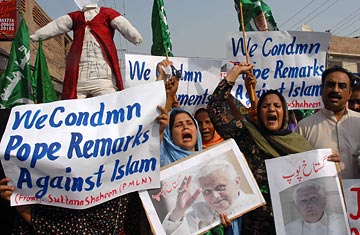
Pakistani protesters hold a rally to condemn Pope Benedict XVI for his remarks about Islam.
Loyal Benedict supporters will rightly point out that the papacy is neither a political office, nor a popularity contest. Yet any leader, whether running a country, a church or a corporation, can do his job better when he builds consensus and clearly communicates his message, without distraction. By any measure, Benedict is at the lowest point of his papacy on this front. He was lambasted by Catholics and non-Catholics alike over both the substance and form of the January lifting of the excommunication of four ultra-traditionalist bishops, including one who denies the basic facts about the Holocaust. Just as that controversy was finally quieting, the Pope torpedoed his own carefully planned voyage to Africa in March by making a point of denouncing condom use as not only forbidden by church teachings, but also a cause of the wider spread of AIDS.
This Pope has the potential to be both at his best and worst when he simply speaks his mind. With all the collaborators at his disposal, it is clear to those of us who write for a living that Benedict has been missing one crucial asset for doing his job better: a good editor. Sometimes just a tweak of a sentence, a word dropped in or whited out, could have saved much heartache and misunderstanding for the Vatican. Over this eight-day trip, the Pope will deliver 28 different discourses, likely to cover everything from inter-religious dialogue, Islamic radicalism to the Holocaust, Middle East peace and the well-being of Christian minorities. Each topic of every speech, pronounced on the Middle East stage, is a potential minefield. If he manages to avoid blatantly offending anyone — and maybe leaves the region a bold idea or two to chew on — he will return to Rome a stronger leader of his global flock.